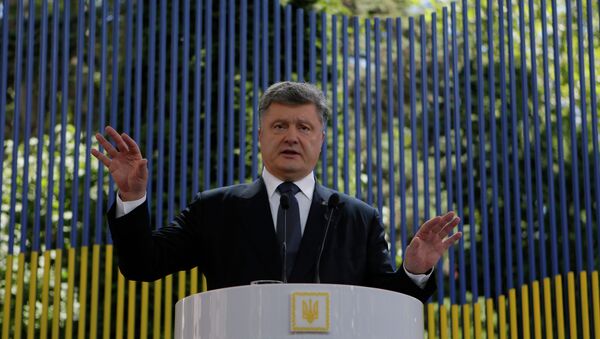"I am confident that within 5-6 years, Ukraine must change and meet with [Brussels'] criteria in order to apply for [EU] membership," Poroshenko stated Friday, prior to the start of talks with European Parliament President Martin Schulz, RIA Novosti Ukraina reported.
Last year, Ukraine signed an Association Agreement with the EU, a treaty which envisions a number of one-sided, structural reforms undertaken by Kiev aimed at 'creating a framework' for further cooperation with Brussels. In September, President Poroshenko also presented a series of reforms under his 'Strategy 2020', which, in his view, should prepare Ukraine for application for membership.
Ongoing War and Collapsed Economy Make Membership Prospects Dim
Last month, Russian journalist, political analyst and Duma MP Alexei Pushkov stated that a "noticeable shift" has occurred in the EU's relations toward Kiev over the past years, with sympathy for post-Maidan leadership "waning," largely over the fact that Brussels "knows very well that the massive casualties among the civilian population in Ukraine's east are predominantly the result of shelling and military action on the part of the Ukrainian Armed Forces."
Also last month, EU Eastern Partnership Commissioner Johannes Hahn noted that the EU cannot take on responsibility for financing Ukraine's economy, especially in consideration of the ongoing conflict in the country's east. "It is not acceptable to us to have a situation where we have to permanently finance a country," Hahn noted at a speech before the Atlantic Council. The Commissioner added that Kiev faces not only the political and diplomatic challenge of ending the conflict, but also the difficult economic task of rebuilding from the conflict's catastrophic economic consequences.
In addition to requirements that candidate nations not have any ongoing internal conflicts and territorial disputes, the EU's terms membership include requirements that a country's national debt not exceed 60 percent of its GDP. According to IMF data, Ukraine's current debt levels stand at more than 100 percent of GDP, with some experts warning of an imminent default.
In March, the IMF approved a $17.5 billion bailout package for Ukraine, noting that additional funds will be required through 2018; the assistance is tied to structural adjustment of the Ukrainian economy, including cuts to government services and subsidies, which experts warn may lead to further economic decline and more misery among the country's impoverished population. Ukraine is still reeling from a dramatic decline in trade and financial ties with Russia, ties which had been formed over hundreds of years. Experts have suggested that while the Russian economy was capable of absorbing Ukrainian agriculture, together with its steel, machine-building and advanced engineering products, the EU market has no need for Ukrainian agricultural goods, or its turbines, airplane components or other industrial goods.
Association Does Not Mean Visa-Free Travel





